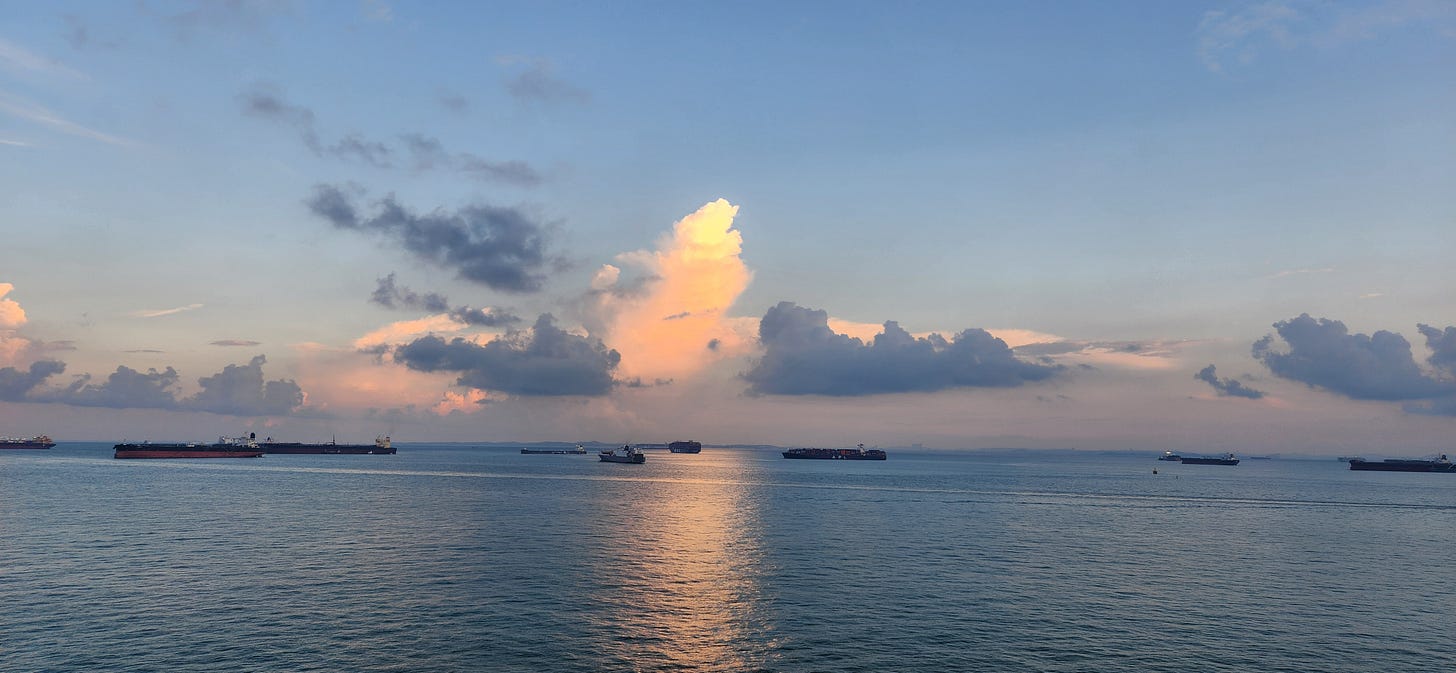I'm sitting off the coast of Singapore, the island-city that literally rose from anonymity to global prominence on the power of air conditioning1. In a floating metal box. With an A/C compressor that keeps trying to burst into flames.
I mean to stick to the byline and try to find meaning in the rare places of the world, and a ship with no A/C next to Singapore presents, if not rarity, at least contrast. But Singapore is less than 2 degrees from the equator and after two days of bright sunshine, I am searching not for meaning but for a will to live. And I have earned a deep, profound, visceral understanding of why Lee Kuan Hew made A/C a priority.
The heat here is no baking, sharp-edged desert heat - the base temperature stays a fairly manageable mid-80s year round. The monsoon winds bring clouds and overcast days as well as sun. A cursory glance at the numbers on your weather app might lull you into a sense of security. What a nice place, you might think. Bet they got some nice open-air markets.2
But the importance of A/C on the island, and the reason for my suffering on the ship, lies in a little number that many people have never heard of, viz. wet-bulb temperature. Without going into a detailed lecture on relative humidity, “dry bulb” temperature records the actual thermodynamic “true" temperature of ambient air. Wet bulb temperature records the lowest temperature at which water evaporates. So, the closer those two numbers are to each other, the higher the relative humidity.
One more thing - The higher the temperature, the more moisture the air can “hold.” At these temperatures, the air can “hold" an immense amount of moisture. And looking back through our logs, the wet and dry bulb numbers are very close together, especially at night. The air is full, so to speak. That means that it's not just hot here. It is sweltering.
The humidity defies description. It directs all of one's thoughts to basic survival. With this much humidity, sweat ceases to evaporate unless there's a stiff breeze. Inside the (dark)(metal) ship, there is no breeze except what can be harvested from overworked AirKing wall fans. The air feels like a felted wool blanket, heavy and itchy, settling onto you from every angle. There is no action undertaken that doesn't immediately drench the actor in sweat. Showers are futile. Sunscreen melts away within minutes. Dry clothing quickly ceases to absorb moisture and only adds to the ever-present awareness of one's own sweaty, struggling body.
I know this will pass. I know our quiet, exhausted electrician will eventually get around to rewiring an A/C wall unit so I can sleep for the first time in days. I know the ship will sail north again soon, and we'll leave behind this tropical oven for cooler waters.
But right now I am sweltering and self-aware. It's almost impossible to get anything done and definitely impossible to think straight. I love recording voice memos to friends on messaging apps, but when I played a couple clips back to myself today I wondered if I was having a stroke. I am incoherent in this place. It's just too damn hot.
Thinking, deeply and coherently, helps to separate us from the animals. In these last couple wool-blanket days I have felt that separation growing thinner in myself. There is so much I'd like to dwell upon, but all that keeps coming to mind is water and sleep and autumn.
Singapore chose to prioritize A/C to let her people think straight. Singapore did not expect people to thrive where they could not think. And so, in this metal box in the sun, I will extend myself that same courtesy. Until the A/C is fixed, I shall not think straight. I will work very little. I will withdraw from myself as much as possible. I shall sit and sweat and occasionally pay attention to my tired, loyal body. I shall think only of water and sleep and autumn.
https://www.vox.com/2015/3/23/8278085/singapore-lee-kuan-yew-air-conditioning
They do.




